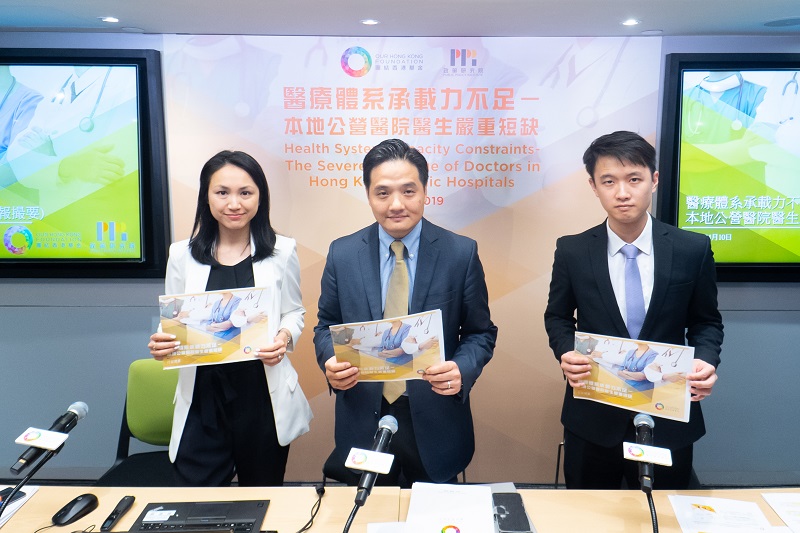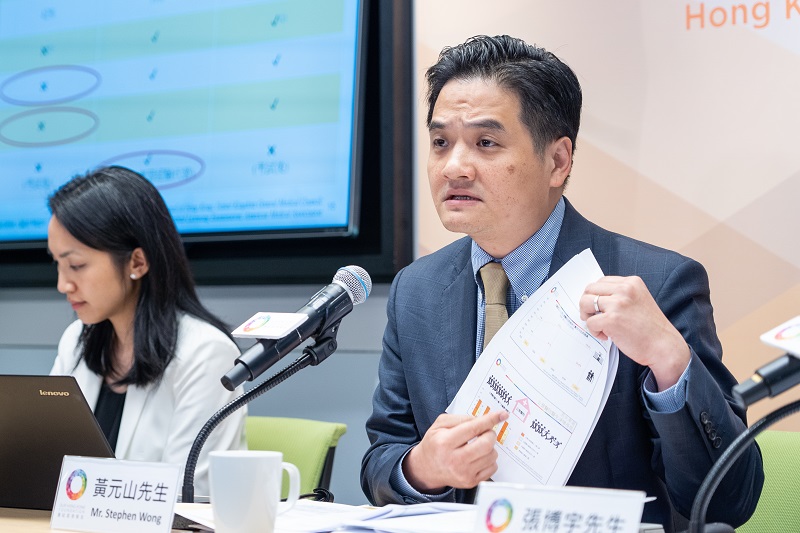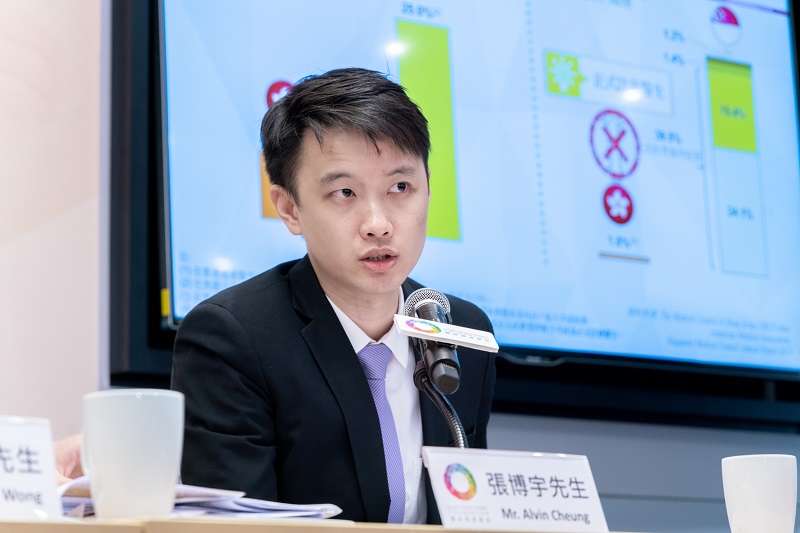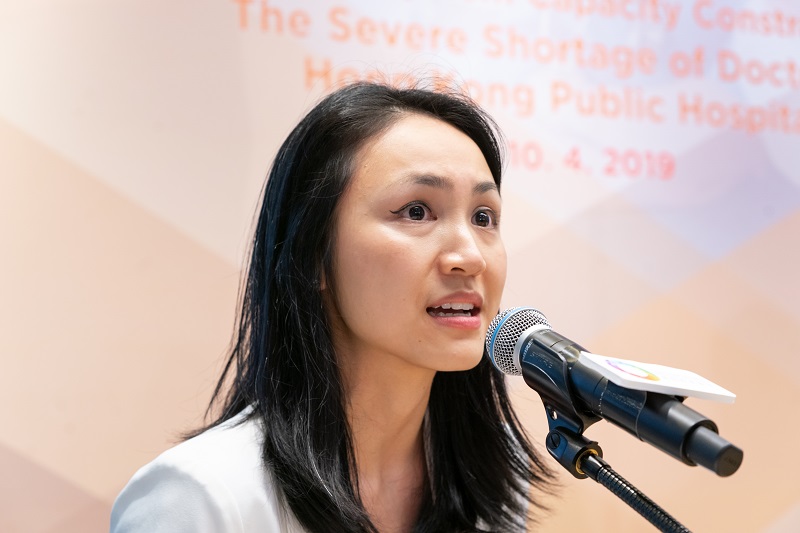Health System Capacity Constraints – The Severe Shortage of Doctors in Hong Kong Public Hospitals
Health System Capacity Constraints -
The Severe Shortage of Doctors in Hong Kong Public Hospitals
(10 April, 2019, Hong Kong) Our Hong Kong Foundation (“OHKF”) has released an advocacy study titled “Health System Capacity Constraints – The Severe Shortage of Doctors in Hong Kong Public Hospitals”. The study highlights the severe shortage of doctors in public hospitals that is exacerbated by our rapidly ageing population and the growing burden of chronic diseases.
Currently, foreign-trained doctors who wish to obtain full registration to practice in Hong Kong must opt for the ‘exam pathway’. While a ‘non-exam pathway’ exists for foreign-trained doctors who wish to obtain limited registration to practice at limited venues for a limited duration, this pathway does not lead to full registration. OHKF advocates introducing greater flexibility for both ‘exam’ and ‘non-exam’ pathways to attract foreign-trained talent and references could be made to international examples. Pertaining to the “exam pathway”, considerations should be given to removing internship experience as a MCHK Licensing Examination prerequisite, and giving the option to substitute the post-exam internship with equivalent overseas experience subject to set conditions. Pertaining to the “non-exam pathway”, considerations should be given to allowing those doctors who have practiced in the public sector for a set number of years to progress from limited to full registration in Hong Kong. Together, all of these recommendations aim to attract more foreign-trained doctors to practice in Hong Kong to alleviate the severe shortage of doctors.

Hanging on a rope stretched too thin — our public healthcare system is on the verge of collapse
There is a severe shortage of doctors in Hong Kong. For every 1,000 people in Hong Kong, there are only approximately 1.9 doctors. This number is well below the average of 3.4 of the Organisation for Economic Cooperation and Development (OECD), Hong Kong is lagging far behind international peers including Singapore (2.4). Hong Kong needs an addition of approximately 3,000 doctors to catch up with Singapore, and approximately 10,000 doctors to catch up with other well-developed regions.
Signs of public hospitals being overloaded are obvious. Our public hospitals provide over 80% and 90% of all inpatient bed days for the entire population and for those aged 65 years or above, respectively. They are, however, staffed with just close to 50% of active doctors in Hong Kong. Although the number of public hospital doctors increased by 24% between 2008 and 2017, the growth rate of public hospital doctors did not match the upsurge in service demand and workload, nor was it sufficient to make up for the number of doctors lost to attrition. As a result, public hospital doctors are required to care for an increasing number of patients that adds to their already heavy workload. As ‘pull factors’ from the private sector increase and public hospitals continue to be overloaded, an ever-worsening doctor shortage situation, particularly in the public sector, becomes likely.
The severe shortage of doctors is exacerbated by a rapidly ageing population and the growing burden of chronic diseases
Hong Kong is home to a rapidly ageing population. The percentage of our population aged 65 years or above is expected to double from 15.9% in 2016 to 29.1% in 2036. Ageing population and the more profound complexity of illnesses among the elderly correspond to a greater demand for health services, particularly in the public sector. This can be exemplified by public hospital bed utilisation ratios where in 2016, every 1,000 people aged 65 years or above required 10.5 beds compared to the 1.9 required by every 1,000 aged below 65 years. The ratio was 15.7 for every 1,000 aged 75 years or above. Alongside ageing population is the rising prevalence of chronic diseases that adds to the burden of our already ailing health system. The current shortage of doctors is well above the number estimated by the Government and is in the thousands, not the hundreds. Therefore, it is our view that due consideration needs to be given to augmenting the role of foreign-trained doctors in our public healthcare system.
Recommendations pertaining to the ‘exam pathway’
Recommendation 1: Providing a comprehensive examination syllabus and revision material for the MCHK Licensing Examination
Under the current system, foreign-trained individuals who wish to be considered for full registration to practice in Hong Kong must pass the 3-part MCHK Licensing Examination. In 2017, the pass rate for part 1 (written exam across two sittings) was an average of just 26.5% and 42% for part 3 (practical clinical exam). More encouraging pass rates were observed in other jurisdictions such as the US for both written (>70%) and practical (>80%) exams.
The comparatively less detailed and accessible examination syllabus, resources and reference materials for examination preparation in Hong Kong, compared with other international examples, potentially hinder applicants from succeeding in their application. Therefore, we recommend the availability of a comprehensive examination syllabus and revision materials for the MCHK Licensing Examination in order to ensure fairness and facilitate examination preparation.
Recommendation 2: Removing prior internship experience as a MCHK Licensing Examination prerequisite
Although those who pass the MCHK Licensing Examination are required to complete a post-exam internship, internship experience itself is a listed MCHK Licensing Examination prerequisite. This serves as a potential barrier for individuals who graduate from medical courses that do not offer relevant experience. Consideration should be given to removing prior internship experience as a MCHK Licensing Examination prerequisite, so as to match standards from other jurisdictions, including the UK and the US.
Recommendation 3: Giving the option to substitute the post-exam internship with equivalent overseas experience
In addition to passing the MCHK Licensing Examination, individuals looking to obtain full registration in Hong Kong must also complete a period of internship assessment at approved local hospitals that cannot be substituted with equivalent overseas experience. Reference should be made to a more flexible arrangement in the UK. To attract more foreign-trained doctors to serve in the public sector, those who pass the MCHK Licensing Examination should be given the option to substitute the post-exam internship with equivalent overseas experience subject to set conditions (for example, requiring the individual to provide services in the public sector for a set number of years).
Recommendations pertaining to the ‘non-exam pathway’
Recommendation 4: Allowing progression from limited to full registration in Hong Kong on condition that the doctor has practiced in the public sector for a set number of years
While individuals applying for limited registration are not required to sit the MCHK Licensing Examination, they also do not eventually progress to full registration. This contrasts with a clear progression track leading to full registration for ‘non-exam pathways’ observed in other jurisdictions such as Singapore – a place where a substantial number of foreign-trained doctors obtain full registration to practice via a ‘non-exam pathway’. Doctors permitted to practice through the ‘non-exam pathway’ make up approximately 40% of registered medical practitioners holding valid practicing certificates. Thus, consideration needs to be given to allowing progression from limited to full registration in Hong Kong after the doctor has practiced in the public sector for a set number of years, increasing the attractiveness of practicing through limited registration in Hong Kong. The Hospital Authority should also consider hiring general practitioners through limited registration.
Recommendation 5: Allowing individuals who possess a medical qualification from the world’s top 50 medical schools to practice with limited registration that would eventually progress to full registration
The compilation of an official list of acceptable medical qualifications for practicing with limited registration, such as possessing a medical qualification from the world’s top 50 medical schools, should be considered, ultimately allowing these qualified individuals to progress from limited to full registration. Permanent residents of the HKSAR who have received medical education from these schools could be prioritised.
Recommendation 6: Relaxing the requirement for necessity to be registered with foreign medical authority
Also limiting the attractiveness of the limited registration pathway in Hong Kong is the explicit requirement for doctors to continuously be registered with a foreign medical authority, a requirement generally not observed in other jurisdictions. To enhance the attractiveness of practicing in Hong Kong, consideration should be given to relaxing the requirement for doctors under limited registration for necessity to be registered with a foreign medical authority.

Mr Stephen Wong, Deputy Executive Director of OHKF and Head of Public Policy Institute, asserted, “Hong Kong’s public healthcare system is on the verge of collapse. Amidst the many challenges faced by our health system, developing, designing and implementing system-wide changes in moving towards a primary care-led, integrated, person-centred health system should be able to alleviate the shortage of doctors in Hong Kong. As such, as we transform our health system, consideration should be given to enhancing the role of multidisciplinary teams of healthcare professionals in addition to tackling the shortage of doctors.”

Mr Alvin Cheung, Head of Social Development of OHKF, pointed out, “There is a severe shortage of doctors in public hospitals, and this has severely impacted the quality of service in the public healthcare system. Before the situation worsens, the Government should take appropriate action by augmenting the role of foreign-trained doctors in Hong Kong’s health system so as to tackle the shortage of doctors.”

Dr Pamela Tin, Researcher of OHKF, pointed out, “Attracting foreign-trained doctors can alleviate the shortage of doctors, OHKF urges the Government to provide flexibility for foreign-trained doctors to practice in Hong Kong, so as to attract more well-qualified foreign-trained doctors to join our healthcare workforce.”
An Advocacy Study on “Health System Capacity Constraints - The Severe Shortage of Doctors in Hong Kong Public Hospitals”
(Chinese version):http://bit.ly/2WYkbAc
(English version):http://bit.ly/2GbamJC



